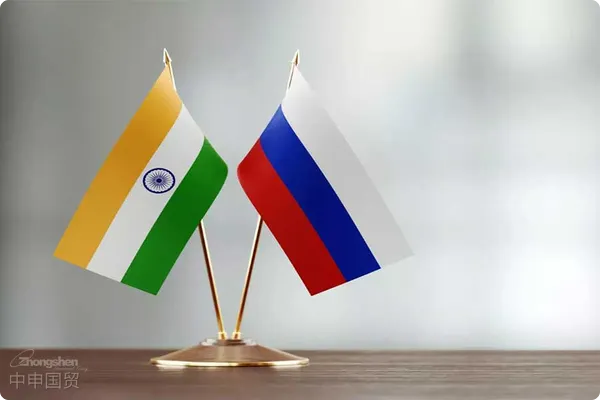- Shanghai Zhongshen International Trade Co., Ltd. - Two decades of trade agency expertise.
- Service Hotline: 139 1787 2118
India and Russia Seek to Strengthen Bilateral Cooperation
Recently, Indian Commerce Minister Sunil Barthwal met with Russias Minister of Economic Development during the 14th BRICS Trade Ministers Meeting in Moscow, primarily discussing bilateral trade. The meeting was significant as the two countries leaders have set a goal to increase bilateral trade to $100 billion by 2030. Currently, India-Russia trade stands at $66 billion, meaning trade must grow by 50% over the next six years.
According to Nikkei Asia, Indian Prime Minister Modi visited Russia in early July, marking his first visit to Russia since the Russia-Ukraine conflict. The leaders of the two countries formulated detailed plans aimed at achieving a significant leap in trade volume. On July 15, Indian Commerce Minister Piyush Goyal stated that India is exploring cooperation with Russia in multiple fields, including trade in electronics, engineering products, and petroleum. Additionally, India has requested Russia to investigate non-tariff barriers faced by its exporters, particularly in the agricultural and pharmaceutical sectors.

U.S. Issues Warning to Indian Banks
Despite the deepening India-Russia relations, the U.S. has expressed concerns. On July 30, according to Russias Kommersant, the U.S. Treasury Department warned Indian banks that Washington might impose sanctions on Indian banks suspected of collaborating with Russian defense enterprises. U.S. Deputy Secretary of State Kurt Campbell previously stated that Indias relationship with Russia affects U.S.-India technological cooperation. On July 24, TASS cited a Reuters report, noting that U.S. Deputy Treasury Secretary Wally Adeyemo pointed out in a letter to the Indian Banks Association that the Russian military relies on imports of critical goods, including machine tools and microelectronics, and expects foreign financial institutions to support these transactions.
In the letter, Adeyemo requested Indian banks to take measures within 30 days to inform domestic enterprises about U.S. anti-Russia restrictions. He stated that any foreign financial institution engaging in business with Russian defense enterprises faces the risk of sanctions, potentially losing access to the U.S. financial system and other financial systems. Although the letter did not specifically express dissatisfaction with Indian banks, this move undoubtedly serves as a warning against Indias deepening economic and trade cooperation with Russia.
Impact on India-U.S. Relations
The complexity of U.S.-India relations is self-evident. The U.S. National Interest magazine noted that Indias defense equipment is highly dependent on Russia. Statistics show that up to 86% of Indias equipment, weapons, and platforms come from Russia. Since 2014, 55% of Indias defense imports have been from Russia. The Indian Air Force, Army, and Navy rely on Russia for 66%, 90%, and 41% of their equipment, respectively. Replacing such a vast inventory is a long-term process, requiring over a decade.
U.S. geopolitical expert Derek Grossman wrote in Foreign Policy that U.S.-India relations remain fundamentally fragile. A full alliance and strategic partnership with the U.S. would mean India losing its strategic autonomy, which has always been a fundamental aspect of Indias foreign policy. Given Indias deep ties with Russia and its high dependence on Russia in the defense sector, U.S.-India relations will face significant challenges.
Background of Deepening India-Russia Cooperation
India-Russia cooperation is not limited to the defense sector. Indian Commerce Minister Piyush Goyal emphasized that India is exploring cooperation with Russia in multiple fields, including trade in electronics, engineering products, and petroleum. The leaders of India and Russia have set a goal to increase bilateral trade to $100 billion by 2030, which will require close cooperation in multiple areas.
During his visit to Russia, Indian Prime Minister Modi discussed various aspects of bilateral relations with Russian President Putin and identified a series of cooperative projects. These projects span multiple fields, from energy to high technology, aiming to promote the shared economic development of both countries.
Related Recommendations
? 2025. All Rights Reserved. 滬ICP備2023007705號-2  PSB Record: Shanghai No.31011502009912
PSB Record: Shanghai No.31011502009912









